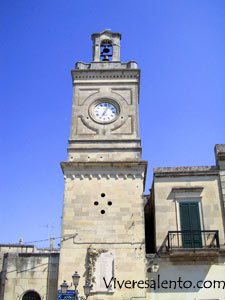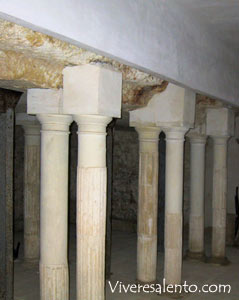|
|

| Inhabitants'name: Castrignanesi |
The civic
coat of arms of Castrignano de' Greci has a fortress with three towers on a golden
background. We do
 not
know exactly when the and how this village was founded. The legend says it was
founded by Minos, the son of Zeus. Some scholars think it was founded by a group
of people from Crete and by their chief, Giapige. Other scholars think it was
created by a Roman centurion called Castrinius who won this land for the courage
he had showed in war. He build a house for himself and his soldiers then the
village grew bigger and bigger. The name of the village could derive from the
Latin ‘castrum’ that means ‘fortress’ and we can suppose that in the past there
was a castle that probably was the origin of the village. In the 9th-10th
century the population grew because some people was running away from the near
hamlets destroyed by the Saracens. This village too was sacked by the
Longobards, Greeks and Saracens. When the Normans came, the King Tancredi gave
the village to Pietro Indrimi. In the 14th century the village was
included in the Principality of Taranto with the Orsini del Balzos. The village
was also ruled by the Guevaras, Giovanni Filippo Prato, the Paganos, the not
know exactly when the and how this village was founded. The legend says it was
founded by Minos, the son of Zeus. Some scholars think it was founded by a group
of people from Crete and by their chief, Giapige. Other scholars think it was
created by a Roman centurion called Castrinius who won this land for the courage
he had showed in war. He build a house for himself and his soldiers then the
village grew bigger and bigger. The name of the village could derive from the
Latin ‘castrum’ that means ‘fortress’ and we can suppose that in the past there
was a castle that probably was the origin of the village. In the 9th-10th
century the population grew because some people was running away from the near
hamlets destroyed by the Saracens. This village too was sacked by the
Longobards, Greeks and Saracens. When the Normans came, the King Tancredi gave
the village to Pietro Indrimi. In the 14th century the village was
included in the Principality of Taranto with the Orsini del Balzos. The village
was also ruled by the Guevaras, Giovanni Filippo Prato, the Paganos, the Barons of Acaya, the Guarinis, the Marescallos and the Protonico, the last were
the Barons Gualtieris. Among the famous people from
Castrignano we remember: Francesco Antonio Meleti lived in the 18th century and
was an appreciated priest and man of Arts. Vittorio Tarantini was a philosopher
of the 15th century. Onofrio da Castrignano e Francesco Marzo were both
scientists and philosophers. Angiolino Cotardo lived in the 20th century, fought
in the Second World War and was also imprisoned. When the war was over he
studied in the University of Naples and took his degree in European Languages
and Literatures. His favourite language was Greek and he went to Greece several
times for seminars. He was also a primary school teacher, he also taught Greek
to children. He wrote several and appreciated books.
Barons of Acaya, the Guarinis, the Marescallos and the Protonico, the last were
the Barons Gualtieris. Among the famous people from
Castrignano we remember: Francesco Antonio Meleti lived in the 18th century and
was an appreciated priest and man of Arts. Vittorio Tarantini was a philosopher
of the 15th century. Onofrio da Castrignano e Francesco Marzo were both
scientists and philosophers. Angiolino Cotardo lived in the 20th century, fought
in the Second World War and was also imprisoned. When the war was over he
studied in the University of Naples and took his degree in European Languages
and Literatures. His favourite language was Greek and he went to Greece several
times for seminars. He was also a primary school teacher, he also taught Greek
to children. He wrote several and appreciated books.
|